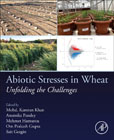
Abiotic Stresses in Wheat: Unfolding the Challenges
Khan, Mohd. Kamran
Pandey, Anamika
Hamurcu, Mehmet
Gupta, Om Prakash
Gezgin, Sait
Abiotic Stresses in Wheat: Unfolding the Challenges presents the current challenges, possibilities, and advancements in research-based management strategies for the adaptation of wheat crops under abiotic-stressed growth conditions. This book comprehensively discusses different abiotic stress conditions in wheat, and also covers current trends in their mitigation using advanced tools to develop resilience in wheat crops. Chapters provide insight into the genetic, biochemical, physiological, molecular, and transgenic advances and emerging frontiers for mitigating the effects of wheat abiotic stresses. This text is the first resource to include all abiotic stresses in one volume, providing important translational insights and efficient comparison. Describes advances in conventional and modern breeding approaches in countering the effect of wheat abiotic stresses Highlights the role of physiological, biochemical and OMICS strategies Includes coverage of biotechnological tools such as whole genome sequencing, nanotechnology, and genome editing INDICE: 1. Wheat and abiotic stress challenges: an overview 2. Mitigation of abiotic stress tolerance in wheat through conventional breeding 3. Speed breeding: a powerful tool for mitigating abiotic stresses in wheat4. Marker assisted breeding for abiotic stress tolerance in wheat crop 5. Epigenetics and abiotic stress tolerance in wheat crops: consequences and application6. Physiological and biochemical approaches for mitigating the effect of abiotic stresses in wheat7. Role of phytohormones in regulating abiotic stresses in wheat 8. Role of ROS in mitigating the effects of abiotic stresses in wheat 9. Regulation of circadian for enhancing abiotic stress tolerance in wheat 10. Changes in root behavior of wheat species under abiotic stress conditions 11. Role of photosynthesis in regulating abiotic stress conditions in wheat 12. CRISPR-Cas Genome Editing for the Development of Abiotic Stress Tolerance in Wheat 13. Signaling responses and their role in the mitigation of abiotic stresses in wheat 14. Functional genomics approaches for combating the effect of abiotic stresses in wheat 15. Role of Transcriptomics in countering the effect of abiotic stresses in wheat16. Role of Proteomics in regulation the effect of abiotic stresses in wheat 17. Crosstalk between small-RNAs and wheat abiotic stresses 18. Combined abiotic stresses in wheat species 19. Advancement in mitigating the effects of temperature (heat and cold) stress in wheat 20. Advancement in mitigating the effects of salinity stress in wheat 21. Wheat responses to radiation stress and its adaptive mechanisms 22. Advancement in mitigating the effects of drought stress in wheat 23. Advancement in mitigating the effects of heavy metals toxicity in wheat 24. Advancement in mitigating the effects of boron/nutrients stress in wheat 25. Advancement in mitigating the effects of waterlogging stress in wheat 26. Advancement in transgenics for combating abiotic stresses in wheat 27. Plant-microbe interactions in wheat to deal with abiotic stress 28. Role of nanotechnology in combating abiotic stresses in wheat 29. Climate change as a cause of abiotic stresses in wheat 30. Wheat genetic resources and gene mining for resistance to abiotic stresses 31. Effect of abiotic stresses on wheat quality
- ISBN: 9780323953689
- Editorial: Academic Press
- Encuadernacion: Rústica
- Páginas: 464
- Fecha Publicación: 20/01/2023
- Nº Volúmenes: 1
- Idioma: Inglés
